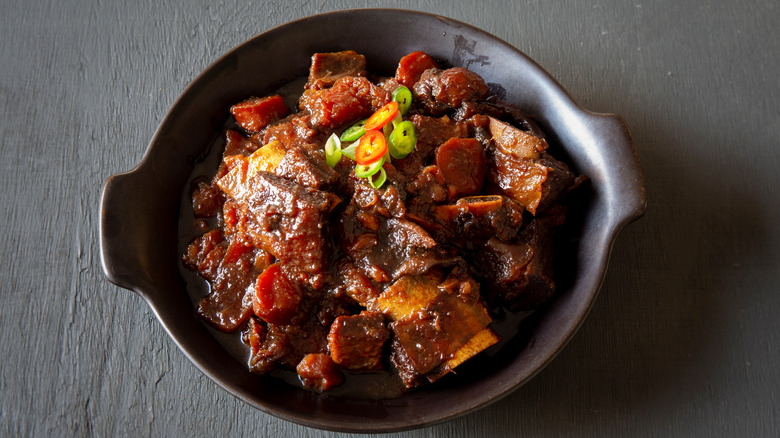Andrew Zimmern's Braising Advice Is All About Momentum
Braising, per Master Class, is a cooking technique that combines two cooking techniques to cook a piece of meat: First, searing the meat and then cooking it low and slow for hours in a brothy liquid. Per Taste of Home, once in this liquid, about a quarter of the meat is left unsubmerged. The goal of braising is to make all the ingredients tender and flavorful. Master Class goes on to explain that when done right, it will leave you with a delicious liquid, a succulent piece of meat, and flavorful additions like carrots or potatoes that taste delightful together. This is especially true when you are working with some of those tougher cuts of meat. Braising will transform the chewiest of cuts into succulent, mouthwatering bites.
However, if just the word "braising" has you shying away from cooking dishes that use this technique, you aren't alone. Braising requires a little TLC because as celebrity chef and host of Magnolia's "Family Dinner" Andrew Zimmern explains, braising may be "simple" but it isn't necessarily "easy" to get right. No one wants to eat chewy braised beef after all. That's why Zimmern's advice on this subject is so critical. He reveals when it comes to putting your braising skills into practice, there is one key component braisers need to master and that's heat momentum. What does that mean?
The secret is the simmer
After your meat is browned properly, vegetables and aromatics have been added, and you've deglazed your pan with your braising liquid, it's time to let your meat cook low and slow. Once that's done, Andrew Zimmern says how you get your simmer on and keep the heat going may be the real key to the process.
Zimmern explains, " ... you should simmer for a while, 5-10 minutes, to establish some thermal momentum in your braise, both in the liquid and the protein." This way even though there might be a slight fluctuation in temperature, there are no interruptions in cooking the meat as you move the pot into the oven or continue cooking on the stovetop.
My Recipe concurs with Zimmern, noting that if you don't simmer before you put your meat in the oven, it is going to take a greater amount of time to cook whatever loveliness you are making for family and friends. So, while braising might seem intimidating, it really isn't, as long as you get that liquid to a simmer before you pop it in the oven.

